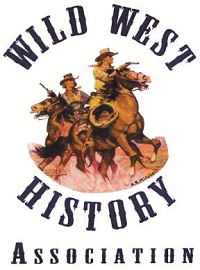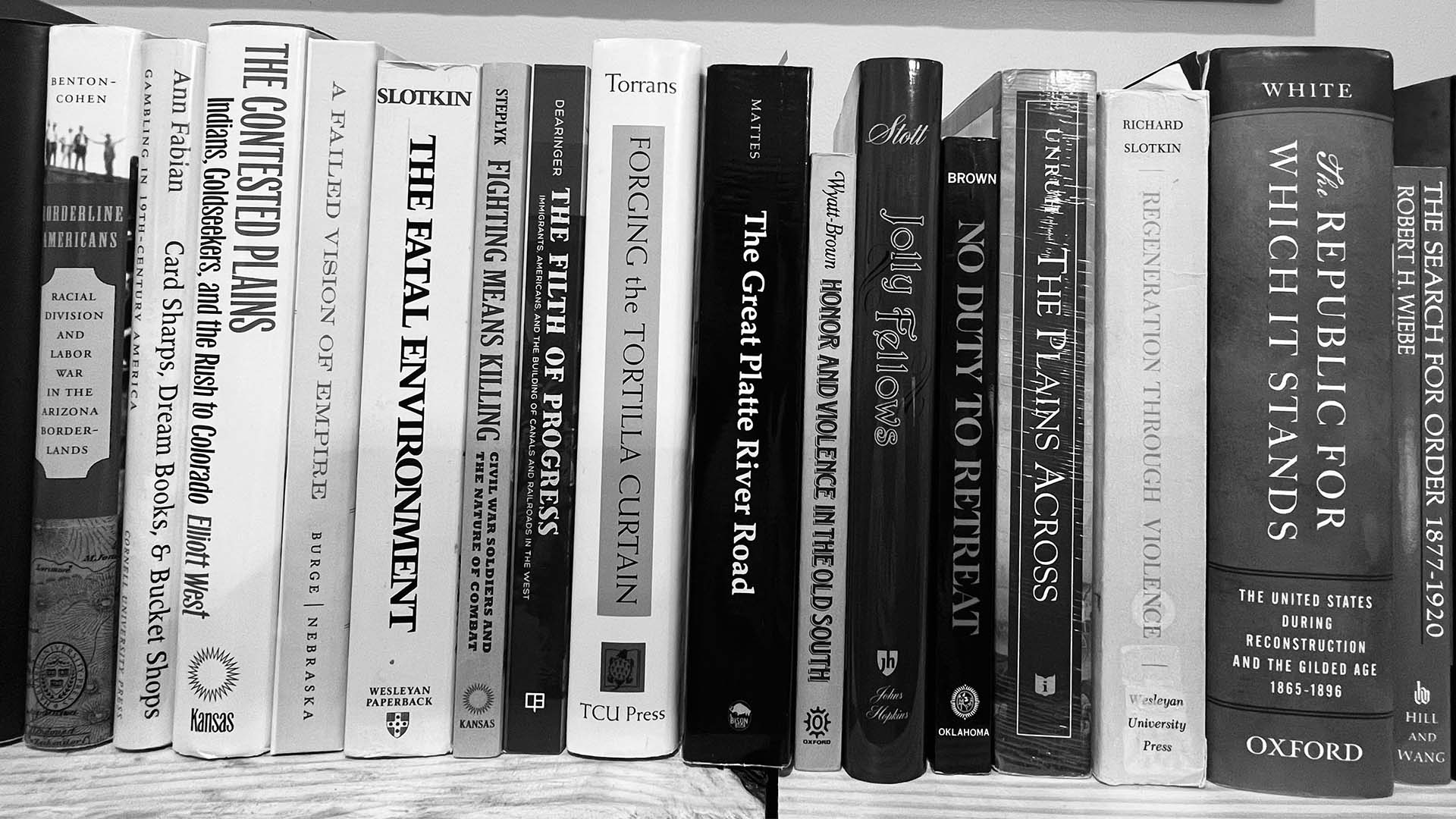I am often asked for my recommendations on the “best” or “most reliable” biographies and studies of Western characters, places, and events. While I am happy to oblige, I will often supplement my suggestions with a few additions of deeper reading. When I was a young upstart in the field, I wore out one of my early mentors, Dr. Gary L. Roberts with e-mail correspondence. I asked him everything. Among my litany of questions was that of book recommendations as I was feverishly trying to build my library with no real goal or focus in mind. Anticipating my needs and both in the immediate and in the future, Dr. Roberts sent back a perplexing reply. He recommended a list of books that I felt were nowhere near what I was needing (wanting). Yet what he did was prepared me for my career ahead by recommending that I read and understand the contextual history – that is the social, environmental, economic, and political conditions of the era that produced outlaws, lawmen, and gunfighters.
Today, I still reference the books he recommended to me and over the course of my own career have found several others of which I find great value. Most of these books take a deep dive into broad, complicated subjects, but these undoubtedly help the interested reader and beginning researcher in their quest to better grasp the 19th-century ideologies of frontier personalities.
Note: the following list reflects my own opinion and should only be considered a primer, not a complete offering. The books are arranged in alphabetical order.
- Beyond the American Pale: The Irish in the West, 1845-1910 by David M. Emmons (University of Oklahoma Press, 2010)
* This book presents a unique and valuable perspective on the story of westward expansion by telling the history of the thousands of Irish men and women who populated the western territories. - Borderline Americans: Racial Division and Labor War in the Arizona Borderlands by Katherine Benton-Cohen (Harvard University Press, 2009)
*A provocative study of industrialized and multicultural borderlands of Arizona in the wake of the Wild West. - Card Sharps, Dream Books, and Bucket Shops: Gambling in Nineteenth-Century America by Ann Fabian (Cornell University Press, 1990)
*An intensive look into the methodology, philosophy, and social conditions which created and supported the 19th-century gambling culture. - The Contested Plains: Indians, Goldseekers, and the Rush to Colorado by Elliott West (University Press of Kansas, 1998)
*One of the finest books available on the study of westward migration. Professor Elliott West takes a calculated, but unforgiving approach to the clash of cultures between whites and the Indigenous tribes of the Great Plains and the Rockies. - A Failed Vision of Empire: The Collapse of Manifest Destiny, 1845-1872 by Daniel J. Burge (University of Nebraska Press, 2022)
*An incredible new book which upends the antiquated theory of Manifest Destiny. - The Fatal Environment: The Myth of the Frontier in the Age of Industrialization, 1800-1890 by Richard Slotkin (University of Oklahoma Press, 1998, reprint)
*A critical volume in understanding how the western myth was viewed by its contemporaries. - Fighting Means Killing: Civil War Soldiers and the Nature of Combat by Jonathan M. Steplyk (University Press of Kansas, 2018)
*While focused on the Civil War, author Steplyk carefully analyzes numerous accounts of Civil War veterans who shared their horrifying motivations for killing on the battlefield and how death affected them later. - The Filth of Progress: Immigrants, Americans, and the Building of Canals and Railroads in the West by Ryan Dearinger (University of California Press, 2016)
*One of the most important books published in the last decade. Author Dearinger explores the intricate nature of multi-cultural interplays among canal and railroad workers and the violence and feuds that came with them. - Forging the Tortilla Curtain: Cultural Drift and Change Along the United States-Mexico Border from the Spanish Conquest to the Present by Thomas Torrans (Texas Christian University Press, 2000)
*If a reader wished to understand the deeply dynamic and geopolitical maneuverings that went into the establishment of the U.S.-Mexico border this is the book to begin with. - The Great Platte River Road by Merrill Mattes (Bison Books, 1987)
*The late historian Merrill Mattes, a writer and researcher of the old school, left no stone unturned in his classic study of this section of the Overland Trail west. - Honor and Violence in the Old South by Bertram Wyatt-Brown (Oxford University Press, 1986)
*One of the first books recommended to me to grasp the deeper meaning of the “southern code of honor” so proudly inherited by westerners like Doc Holliday. - Jolly Fellows: Male Milieus in Nineteenth-Century America by Richard Stott (Johns Hopkins University Press, 2009)
*What made men manly in the 19th-century? Brawling, gambling, drinking, bare-knuckle fighting, and more are all carefully analyzed in this book. - No Duty to Retreat: Violence and Values in American History and Society by Richard Maxwell Brown (Oxford University Press, 1992)
*Considered to be the Bible of both the history of violence and analysis of violence in America, this book is an indispensable resource despite when the author is at fault for generalizing too often. - The Plains Across: The Overland Emigrants and the Trans-Mississippi West, 1840-60 by John D. Unruh (University of Illinois Press, 1993, reprint)
*Published posthumously, The Plains Across remains one of the best treatments of the history of overland migrations ever written. - Regeneration Through Violence: The Mythology of the American Frontier, 1600-1860 by Richard Slotkin (University of Oklahoma Press, 2000, reprint)
*The second book in Slotkin’s enormous trilogy, this book helps readers grasp difficult concepts of how the frontier was viewed by contemporaries at times when the frontier was still no further west than the Allegheny Mountains. - The Republic for Which it Stands: The United States During Reconstruction and the Gilded Age, 1865-1896 by Richard White (Oxford University Press, 2017)
*A massive undertaking, author White successfully captures the highlights and political nuances that made America prosper during this pivotal era. - The Search for Order: 1877-1920 by Robert H. Wiebe (Hill and Wang, 1966)
*A classic study showing how individualism eroded as the country neared the Progressive era and how, during this 50-year-span, violence and social virtues were driven by urbanization and immigration on grand scales. - Valley of the Guns: The Pleasant Valley War and the Trauma of Violence by Eduardo Obregón Pagán (University of Oklahoma Press, 2018)
*Not just a book on the Pleasant Valley War of Arizona fame, but the author makes this book exceptional by explaining the effects of violence through discussions of Post-traumatic stress disorder. - West From Appomattox: The Reconstruction of America after the Civil War by Heather Cox Richardson (Yale University Press, 2007)
*A necessary book for anyone looking to understand the world of the frontier west. West From Appomattox is a history of the whole United States during the era of Reconstruction and how that federal policy helped to shape our national identity for years to come.
Written by Erik J. Wright.

